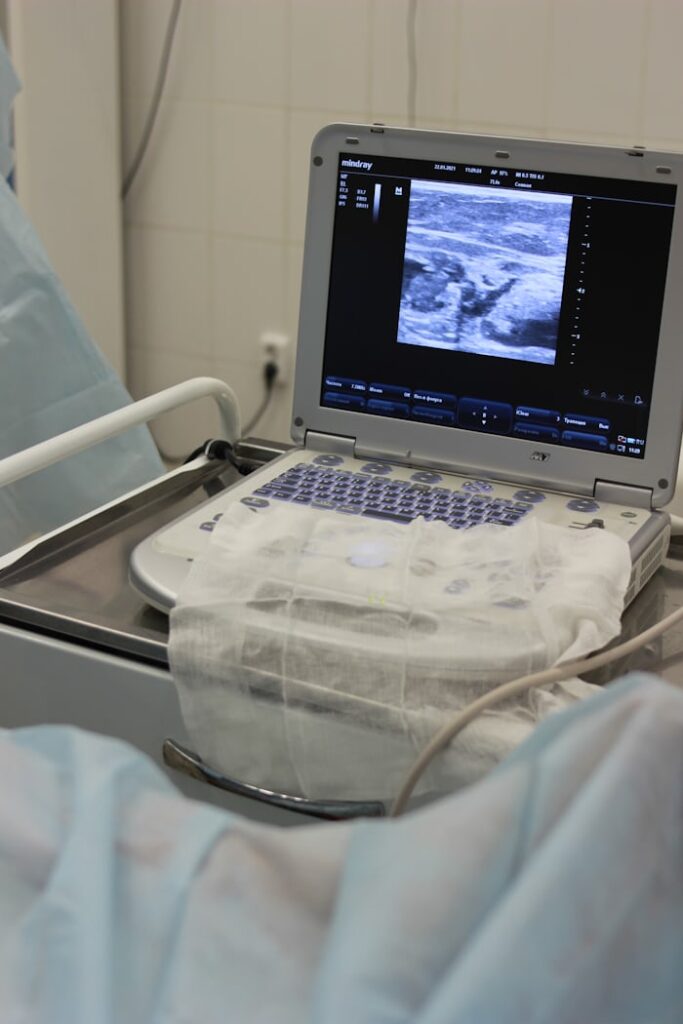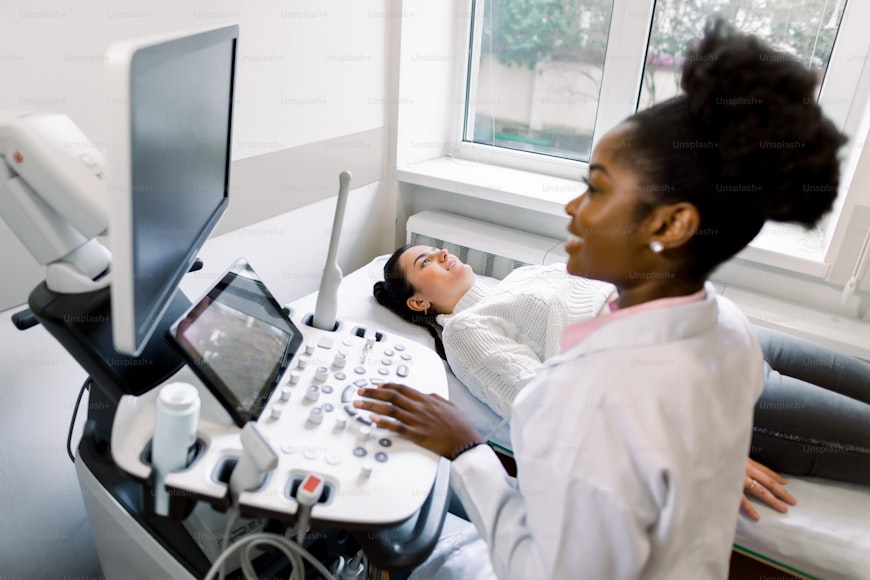Have you ever found yourself in a medical predicament of your own making? In today’s blog post, Accidentally Ate Before Ultrasound Scan, we dive into a common mishap that many patients have experienced. That moment of realization when you’ve absentmindedly munched on your morning toast, only to remember you were supposed to fast for an upcoming ultrasound. Don’t worry – you’re not alone in this gastronomic gaffe.

For certain types of ultrasounds, particularly abdominal ultrasounds, fasting is essential. The primary reason for this is to ensure that the stomach and intestines are empty, reducing the presence of gas and food that can interfere with the sound waves
Table of Contents
We’ll explore what happens when you break the pre-scan fast (although, not every ultrasound scan will require a pre-scan fast), the reasons behind those pesky “empty stomach” instructions, and what to do if you find yourself in this situation. So sit back and let’s unravel the consequences of this all-too-familiar medical misstep.
What Happens If You Eat Before An Ultrasound?
1 Reduced image quality
• Food and liquid in your digestive system can create acoustic shadows, making it difficult for sound waves to penetrate deeper tissues.
• Gas bubbles from digestion can scatter ultrasound waves, causing distortions in the image. Also, the presence of food in the stomach and intestines can create a “noisy” background, obscuring subtle details of nearby organs.
2. Inconclusive results
• With compromised visibility, radiologists may be unable to get a clear view of the target organs or structures. This can lead to incomplete assessments, particularly when looking for small abnormalities like gallstones or minor tumors.
In some cases, the scan might need to be repeated, leading to delays in diagnosis and treatment.
3. Misinterpretation risks
• Food-related artifacts could potentially be mistaken for abnormalities, leading to false positives. For instance, a full stomach might compress the pancreas, altering its appearance and potentially mimicking pathological changes. Conversely, real issues might be masked by the presence of food and gas, potentially leading to false negatives.

4. Altered organ positioning
• A full stomach can physically push or compress nearby organs, slightly altering their position or shape. This can be particularly problematic when precise measurements are needed, such as in assessing organ size or tumor dimensions.
5. Reduced diagnostic value
• For certain studies, like gallbladder examinations, the organ’s function in response to fasting is part of the assessment. Eating beforehand can invalidate these functional studies.
• In cases where contrast agents are used, food in the system can interfere with the absorption and distribution of these agents, potentially compromising the exam’s effectiveness.
6. Time and resource waste
• If the scan quality is too poor to be useful, it may need to be rescheduled, wasting both the patient’s time and valuable medical resources. This can also lead to increased healthcare costs if additional scans are required.
7. Potential for missed diagnoses
• In worst-case scenarios, significant abnormalities might be overlooked due to suboptimal imaging conditions, potentially delaying crucial diagnoses and treatments.
Understanding these impacts underscores the importance of following pre-scan instructions carefully. While it might seem inconvenient to fast before an ultrasound, doing so ensures the best possible image quality and diagnostic accuracy, ultimately benefiting the patient’s health and care.
Can you drink water before an ultrasound fasting?
The short answer is: It depends on the type of ultrasound and specific instructions from your healthcare provider. However, in many cases, drinking water before an ultrasound is not only allowed but often encouraged. Let’s break this up further:

1. General rule
For many types of ultrasounds, especially abdominal scans, patients are often instructed to drink water and have a full bladder before the examination. The amount of water and timing can vary, but it’s common to be asked to drink 32 ounces (about 1 liter) of water an hour before the scan.
2. Why water is often allowed or encouraged
A full bladder can help improve the visibility of pelvic organs like the uterus, ovaries, and prostate. Water doesn’t interfere with abdominal imaging the way food does; it can actually enhance the quality of some scans. Staying hydrated can make it easier for the technician to obtain clear images.
3. Types of ultrasounds where water is beneficial
• Pelvic ultrasounds
• Obstetric ultrasounds (for pregnant women)
• Some abdominal ultrasounds
• Renal (kidney) ultrasounds
4. Exceptions
Some specific types of ultrasounds may require you to abstain from all food and liquids, including water. For example, certain gallbladder examinations might require complete fasting, including water.
5. Following specific instructions
Always follow the specific instructions provided by your healthcare provider or the imaging center. These instructions are tailored to your particular examination and medical situation.

6. If you’re unsure
If you haven’t received clear instructions about water intake, it’s best to contact your healthcare provider or the imaging center for clarification. It’s always better to ask than to guess and potentially compromise the quality of your scan.
7. Timing matters
If water is allowed, pay attention to when you should drink it. Drinking too early might lead to an empty bladder by scan time, while drinking too late might not allow enough time for your bladder to fill.
8. Moderation is key
While a full bladder can be helpful, an overly full bladder can cause discomfort and make it difficult to lie still during the examination. While water is often allowed and even encouraged before many types of ultrasounds, it’s crucial to follow the specific instructions given for your particular examination. When in doubt, always check with your healthcare provider. Proper preparation, including appropriate water intake when advised, can significantly contribute to obtaining clear, diagnostically useful ultrasound images.
What not to do before an ultrasound

- Don’t eat before ultrasound appointments that require fasting: Eating before an ultrasound that requires fasting is one of the most common mistakes patients make. If you ate before ultrasound, it can significantly impact the quality of the images. If you accidentally ate before ultrasound, contact your healthcare provider immediately to determine if rescheduling is necessary.
- Avoid gassy foods and carbonated drinks: Even if your ultrasound doesn’t require complete fasting, avoid foods that produce gas. If you ate before ultrasound and consumed gassy foods, it could create additional imaging challenges.
- Don’t smoke: Smoking can increase gas in your digestive system. By doing so you’re compounding potential imaging issues.
- Avoid chewing gum: Chewing gum can lead to swallowing air, which creates gas. If you ate before ultrasound and chewed gum, you might have introduced extra air into your system.
- Don’t wear excessive jewelry or metal objects: Metal can interfere with some ultrasounds. If you ate before ultrasound and are worried about that, don’t add to potential issues by wearing items that might interfere with the scan.
- Don’t apply lotion or powder to the area being examined: These products can interfere with the ultrasound gel’s effectiveness.
- Don’t empty your bladder (for certain ultrasounds): For pelvic or obstetric ultrasounds, a full bladder is often required. Even if you ate before ultrasound, maintaining a full bladder might still be necessary.
- Don’t engage in strenuous exercise: Vigorous activity can alter blood flow and potentially affect ultrasound results. If you ate before ultrasound, adding intense exercise could further complicate the scan.
- Don’t take certain medications without approval: Some medications can affect ultrasound results. If you ate before ultrasound and are concerned, also check if your medications are approved.
- Don’t bring valuables: While not directly related to eating, it’s best to leave valuables at home. If you’re stressed because you ate before ultrasound, you don’t want the added worry of valuable items.
- Don’t be late: Arriving late might rush your preparation. If you ate before ultrasound and are running late, you might not have time to discuss this with the technician.
- Don’t withhold information: If you ate before ultrasound, be honest with your healthcare provider. Withholding this information can lead to inaccurate results.
Conclusion: Navigating the Consequences When You Accidentally Ate Before Ultrasound
Accidentally consuming food before an ultrasound examination is a common mistake that can potentially impact the quality and accuracy of the imaging results.

✓ Firstly, eating before ultrasound can cause increased gas in the digestive system, which may obstruct the view of certain organs, especially in abdominal ultrasounds. This occurs because the sound waves used in ultrasound imaging have difficulty penetrating through gas-filled areas, resulting in unclear images.
✓ Patients who ate before ultrasound might experience discomfort during the procedure due to bloating or fullness.
✓ Moreover, for someone who ate before ultrasound, this can affect the visibility of the gallbladder, a crucial organ often examined during abdominal ultrasounds. After eating, the gallbladder contracts to release bile, making it smaller and potentially more challenging to visualize. This is why many healthcare providers recommend fasting for several hours before certain types of ultrasounds.
✓ In some cases, if a patient ate before ultrasound, the technician or radiologist might need to reschedule the examination. This is particularly true for specialized ultrasounds that require a completely empty stomach, such as those focusing on the upper abdominal organs or certain cardiac ultrasounds.
It’s important to note that not all ultrasounds require fasting, and the impact of having ate before ultrasound varies depending on the specific area being examined. For instance, obstetric ultrasounds or those focusing on extremities are generally less affected by recent food consumption.
If someone realizes they ate before ultrasound accidentally, they should inform the medical staff immediately. In some cases, the examination might still proceed, but the radiologist will take into account that the patient ate before ultrasound when interpreting the results.
Finally, while eating before an ultrasound can potentially affect the imaging quality, the severity of the impact depends on various factors. You should always strive to follow pre-examination guidelines to ensure the most accurate diagnostic results.

